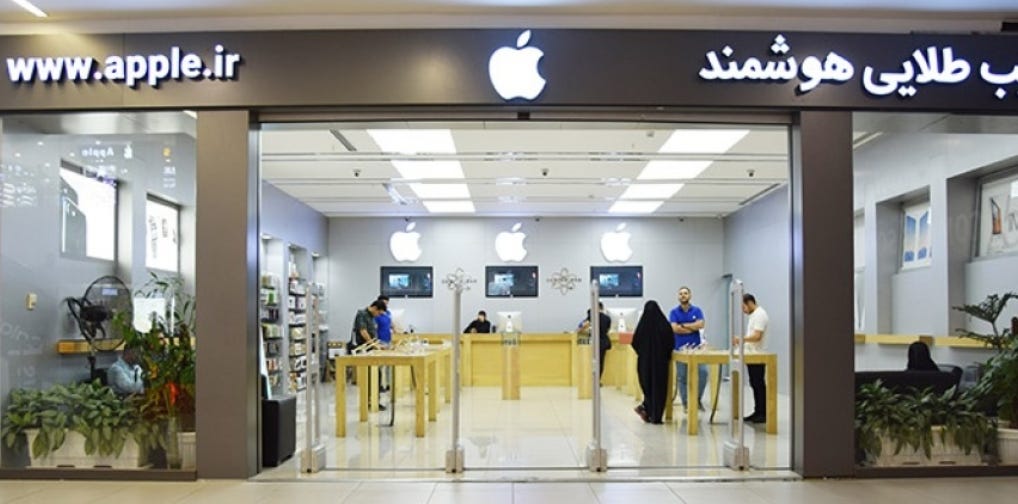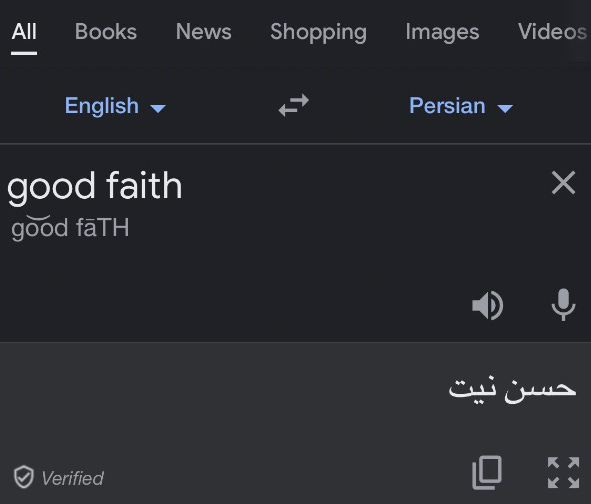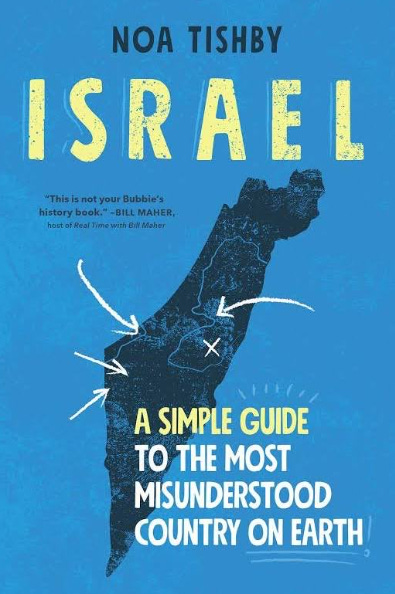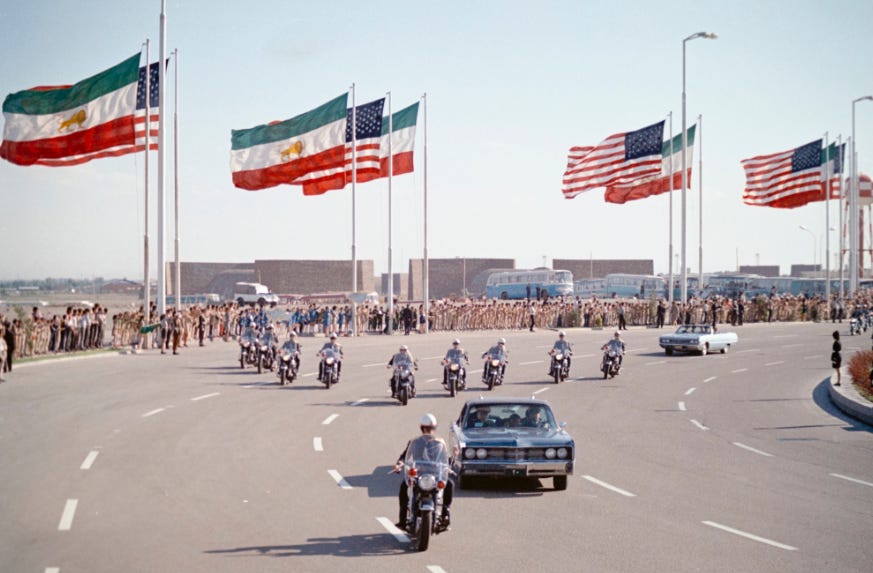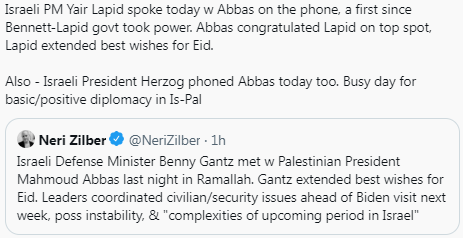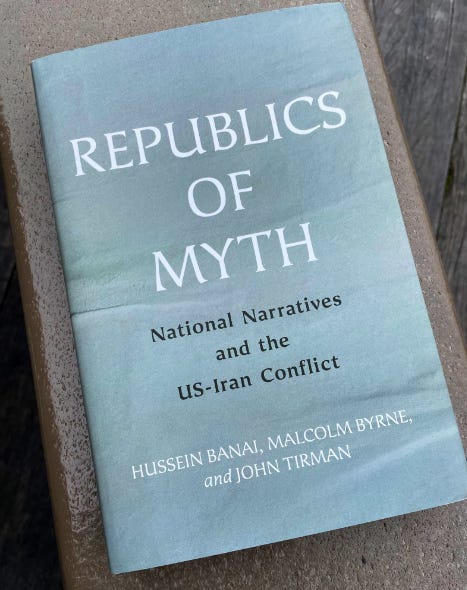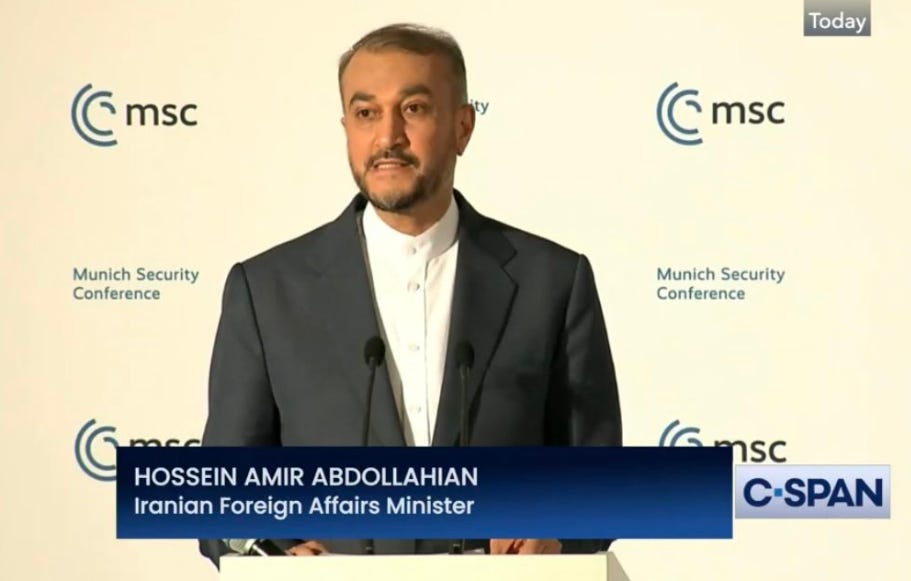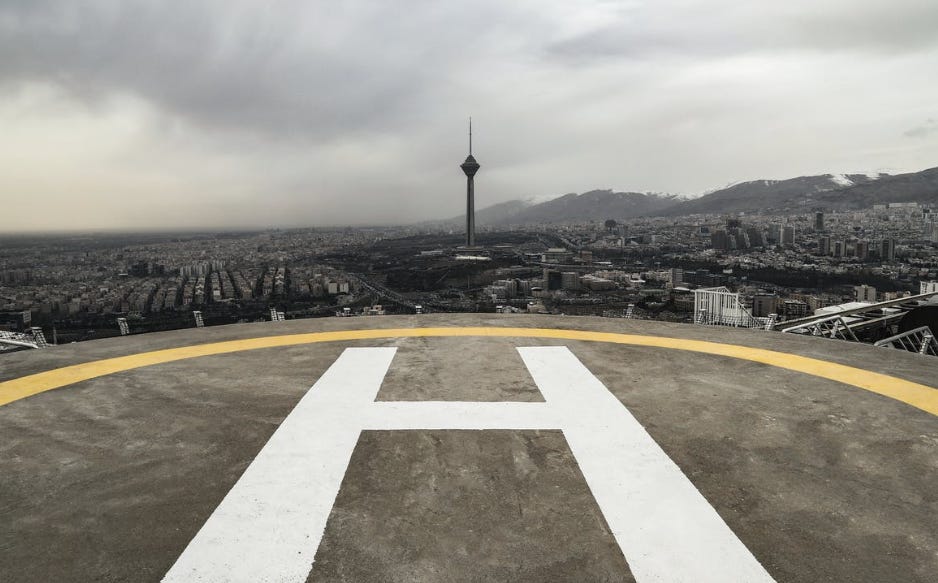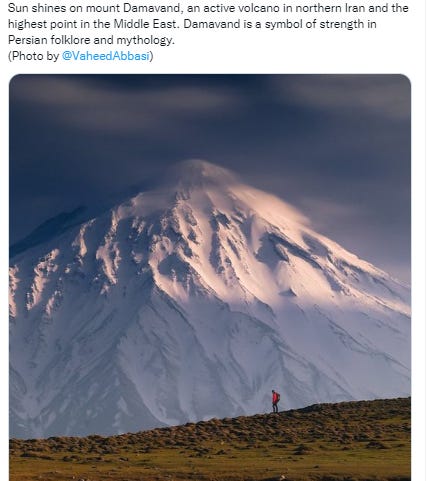Good Faith to Prevent Another War: Israel-US and Iran
still any hope for peace in entirely Middle East
That not all is lost and there is still hope for an agreement if all sides make some compromise and meet somewhere halfway. To prevent another war alongside Russia - Ukraine. Even if Western arms don't change the battlefield equation, US officials describe the stakes of ensuring Russia doesn't win in Ukraine as so high that they are willing to countenance even a global recession & mounting hunger.
No deal can’t be an option because no deal is Iran on the brink of having a nuclear weapon and a nuclear arms race being set off in the Middle East. Given everything we're dealing with in Ukraine now, why on earth would we want that problem? So, preventing another war, likely the US - Israel vs Iran, is a good deal, should. A good faith from each other.
Still think it's remarkable Iran even has direct talks with the US when US political decisions are influenced and largely made by people like Hawkish-spirit amid the Biden administration like Burns, McMaster, until Jake Sullivan. The Iran-Israel dynamic is interesting. If Obama had to restrain an Israeli attack on Iran's nuclear program, then by definition the JCPOA was a 'good deal'. If the JCPOA was truly a 'bad deal' then either Israel would have attacked Iran, or it is too weak to do so.
Unlucky for Biden. Amid his purpose to reiterate the U.S. face in the Middle East, and even dismissed Khashoggi case just to “make happy” MBS Saudis, another unlucky thing happened: Unstable Israel domestic politics (again). Several senior lawmakers quit Israel's governing coalition in a surprise move. Israel is heading to its 5th election in 3 years. The coalition would vote to dissolve parliament next week. That will allow for a snap election some time this fall. Foreign Minister Yair Lapid will likely take over as interim PM. A wave of violence has provided new tests for Naftali Bennet's fragile government — from both the left and the right.
The collapse of Israel's ungainly governing coalition sets up an awkward visit for Biden in a few weeks and a fifth election in just over three years. Although a new deal with Tehran is unlikely, and Israel turmoil, the U.S. can still create space for diplomacy, and (the funniest): it's a Mossad ball.
The Iran regime changed in the presidential election last year and hardliners are now in power. More IRGC members in cabinet. Even amid “radicalized regime” in Tehran, Biden has for the first 6 months in office a golden window of opportunity with the previous admin in Tehran, the same team that previously negotiated the nuclear agreement. But the Biden admin hesitated in a return to the deal and thought they could use sanctions to pressure Iran and get a better deal. That was an illusion. We ended up with a Biden Middle East policy that is basically the Trump Middle East policy without the rhetoric.
And in Tel Aviv, Mossad radicalized itself to accuse Iran on (support wholeheartedly) amid Israel-Palestube war 2021. So Mossad prepared a clandestine step, likely since 5 weeks ago, several IRGC high-ranking members have been killed mysteriously.
Tehran suspects Israel poisoned (at least) Two Scientists to death - one of them, Ayoub Entezari, was an aeronautical engineer who worked for a military research center, and the other, Kamran Aghamolaei, was a geologist.
From the Tehran viewpoint, the US policy now is a continuation of Trump’s maximum pressure, though the Biden admin doesn’t like to call it that. But for Iran until sanctions are lifted, just the change of rhetoric is not enough. Washington and Tehran are at a standstill, with each side viewing the other as intrinsically hostile to its interests. The prospects of any negotiation being conducted in such a poisonous atmosphere is close to nil.
The only way to save the Iran Deal is for both sides to meet in the middle. Diplomacy is about compromise, and that is exactly what we need right now. The readiness with which Israel is now being accepted by some Arab leaders after years of diplomatic isolation, and if Israel has good deeds, Israel should repair its relationship with Tehran. Looks impossible nowadays, unless commitment. It’s real business was urgent diplomacy, spurred by the pending nuclear agreement with Iran and the war in Ukraine.
FM (and now interim PM Israel) Yair Lapid said a "good deal" with Iran "is a good thing". But a bad deal is worse than no deal with tighter sanctions. The problem, no synchronized between Foreign Ministry office and Mossad: several IRGC members since 5 weeks ago have been killed, mysterious, and of course just one accused: Mossad.
Amid stubborn Mossad about Iran, another stubborn in DC: the internationalists. Internationalists insist that the U.S. should retain its position of global armed primacy. Restrainers urge a fundamental rethinking of the U.S. approach to foreign policy, away from militarism and toward peaceful forms of international engagement. After several mysterious deaths by Mossad on high-ranking IRGC, earlier June, IAEA condemned Iran for refusing to cooperate with a probe into past nuclear work. A day later, Tehran retaliated by removing 27 IAEA cameras that were put in place to monitor activities at several nuclear facilities.
Israel would have no problem if the United States entered a strong nuclear deal with Iran that would permanently limit its ability to assemble a nuclear weapon, and that reaching a resolution with the Palestinians was now a lower priority for his government, behind the pandemic and the economy.
Lapid's willingness to sanction a U.S. deal with a country Israel deeply distrusts may reflect in part the conclusion that the Biden administration’s hopes for a nuclear agreement with Iran now seem all but shattered. War with Iran is a completely avoidable conflict. While military families stand ready to serve when called upon, our service should not be squandered on fights that could be prevented by responsible statecraft. Military force should only be a last resort. 10-15 Trillion Dollars has already been wiped out since January, and even not only because of the Russia - Ukraine war.
The yearlong effort to restore the 2015 accord that President Donald J. Trump abandoned — with Israel’s support — has failed so far, and Iran has rejected any effort to make the agreement “longer and stronger,” the goal outlined by Secretary of State Antony J. Blinken.
Funny things: before appointed to be FM under Biden regime; Blinken argued against putting the IRGC on the terror list. Both Bush and Obama had considered it, he argued, but "the potential blowback outweighed the benefits.". Historically, white chickens have regarded themselves as rules makers and black/brown chickens as rules takers.
Contrary to Blinken, Lapid highlighted the “second best would be no deal but tightening the sanctions and making sure Iran cannot go forward. And the third and worst is a bad deal. When he was in Israel, National Security Adviser Jake Sullivan suggested that the window for continued diplomacy had come down to a matter of “weeks.”
Another funny thing. Even, Former White House Spokesperson, Jen Psaki was said, RGC designation was "a solely political move because it accomplishes nothing new" though it will risk killing the Iran Deal. Psaki, according to the Electronic Intifada investigation, worked for an Israeli firm “AnyVision”, then “AnyVision” accused of involvement in surveillance of Palestinians under Israeli military occupation. Psaki’s public financial disclosures show that she earned at least US$5,000 as a “Crisis Communication” for AnyVision. Psaki has operated a communication firm “EVERGREEN CONSULTING” since a month after Former President Barack Obama left office on January 19th 2017. This covers the period when “AnyVision” faced a scrutiny and backlash PR crisis over its alleged complicity in Israel’s abuses of Palestinian rights.
Iran received sanctions relief because they agreed to ship out 97% of its enriched uranium out of the country, mothball thousands of centrifuges, and allow the IAEA to establish the most stringent sanctions regime in history. If you really wanted the U.S. to withdraw from the Iran nuclear deal and implement a totally useless maximum pressure strategy, you can’t wash your hands years later and pretend this decision didn’t trail the path to our current predicament. Some of the internationalists and hawkish howling about Iran’s breakout time also wanted to leave an accord that was specifically designed to prevent said breakout time. It’s absurd.
Iran FM Hossein Amir-Abdollahian said they made a new compromise offer, but the US seem to deny. Here is what Iran is offering according to this: Tehran will drop IRGC delisting demand & will instead demand several key IRGC econ units like Khatam al-Anbiya be listed. Khatam is a major IRGC-owned engineering firm that handles everything from upstream oil to major infrastructure projects. Economic units like Khatam are actually very important to the Iranian economy as they can perform functions other domestic firms can't. But Hossein also cited that IRGC commanders always tell us that if you get to a point that a deal seems beneficial to the people, don’t delay an agreement because of the IRGC.
Worth mentioning that previous proposals about how to limit IRGC economic influence in Iran often revolve around having them sell off various regular businesses & focus on major units like Khatam that are not competing with other businesses. In Tehran's view, of course DC and Tel Aviv (also entirely EU) ask too much from Tehran. 43 prominent European figures urge American and Iranian leaders to show flexibility and reach a nuclear deal, warning that failure will have grave consequences. Signatories include former senior officials and top diplomats from the UK, France, Germany and a dozen European countries.
Covert operations to slow Iran’s nuclear program, came amid a disagreement between American and Israeli officials over whether Israel’s sabotage program is counterproductive. There is considerable evidence that each time Iran’s nuclear facilities have been destroyed, Tehran has gotten them back into operation quickly, installing newer, more efficient centrifuges that enrich uranium at a faster pace. Sanctions on Iran serve as collective punishment. They (the West) threaten the livelihood of people in a manner akin to war.
Any improvement will be illusory if both sides refuse to do their part in de-escalating tensions. For Iran, this will require getting the Shia militia units it supports in Iraq in line and continuing to allow IAEA inspectors to conduct their work. For the U.S., it means finally coming around to the realization that maximum pressure has been a catastrophic blunder. The only alternative — deeper animus, a severance of all dialogue, a long-term clash of wills and all the security risks such a clash entails) — is no alternative at all.
Punishing Iran wasn't all it was cracked up to be, then, a relatively easy one to sell to an administration staffed to the gills with Iran hawks. The main theoretical assumption underlying the maximum pressure campaign was as shallow as it was tempting: pummel the Iranian economy with so many restrictions that the ayatollahs would have no choice but to crawl back to the table on their hands and knees and negotiate a new agreement on Washington’s terms. In Iran, repeatedly the U.S. has become "addicted to the overuse of the stick, and the under-use of leadership by example, trade and aid, and diplomacy.
Iran’s former foreign minister Kamal Kharrazi says that Iran has always been ready for a deal and a deal is possible but it depends on the will of the United States. Says the IRGC has several entities that are important to Iran’s economy. In another side, the U.S. special envoy for Iran, Rob Malleysays if nuclear talks collapse, tensions will increase in region, but the US goal is to de-escalate.
Biden's Middle East policy seems to be to simply muddle through. They want to stay close to regional autocrats, minimize criticism and hope that the dam doesn’t break. Which is why Biden's line that the IRGC is a non-nuclear issue is less than convincing. Rather, it seems to reflect Biden's unwillingness to pay the political price to rejoin the JCPOA - particularly as he seems to prefer a different deal in the region: (re)sweetened it to Riyadh (MBS), but reluctant to hit bigger sanctions on Tehran. it’s also a reminder of why U.S. foreign policy is in sore need of some common sense
The Iranians are as resistant to altering their position today as they were three years earlier. Indeed, if anything, Iran has acquired additional leverage by increasing its enriched uranium stockpile in Bushehr. Despite joining with the U.S. in a resolution against Iran in the IAEA, E3/EU are worried that the U.S. seeks to win the blame game for the failure of the JCPOA, not to save it. The key obstacle holding up the Vienna talks has nothing to with Iran's nuclear program and instead has to do with the Islamic Revolutionary Guard Corps' "foreign terrorist organization" designation.
The only thing U.S. policy has achieved thus far is an Iran that is more aggressive about when and where to use military force, a resurgent camp of Iranian hardliners grabbing ever more power in Tehran, a constellation of rockets and mortars slamming into U.S. military facilities on a weekly basis. 14 months of talks are circling the drain thanks to an issue that has nothing to do with Iran’s nuclear program. One more data point to consider: the longer the stalemate drags on, the more enriched uranium Iran is producing—including at the 60% level in Bushehr.
Maximum pressure will fail to change the regime's behavior, but it will ratchet up tensions between the U.S. and Iran, possibly inciting a crisis or war.




